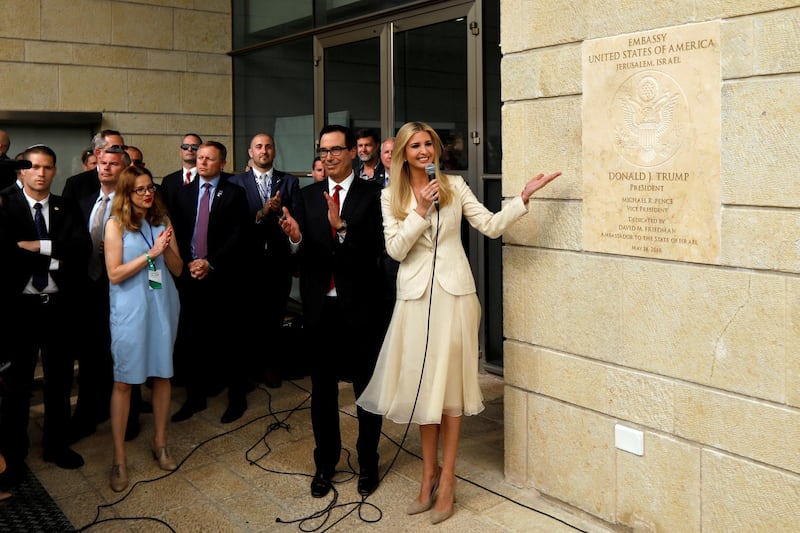One year ago, as dozens of Gazans were being killed at the border fence with Israel, Ivanka Trump, the US President’s daughter-in-law was unveiling a plaque at the new US embassy building to great fanfare in West Jerusalem.
Twelve months on, that decision has not reaped the diplomatic benefits that the Trump administration had hoped for on the campaign trail. Only one diplomatic mission – that of Guatemala – has moved to the contested alongside the American building, and that could soon be gone.
The Arab world has not changed its position that the city should be shared with the Palestinians, viewing the mission as both illegitimate and inflammatory.
Ardent Israel supporters say the security threats that Arab leaders had warned of before any such move are yet to materialise. But others would argue differently. Some of the biggest protests in years have massed in Gaza, and Palestinian attacks have continued in both occupied East Jerusalem and the occupied West Bank around Israel’s illegal outposts.
Israel captured and occupied East Jerusalem in the 1967 Arab-Israeli War, a move that the international community has never recognised.
But Israel’s hard-right government had hoped to build a wave of diplomatic momentum around the US becoming the first country to relocate its mission to the city since all were removed in the 1980s after Israel moved annex the city.
But while it has given Israeli Prime Minister Benjamin Netanyahu a much-needed propaganda victory amid his corruption troubles, the move has largely become a damp squib on the world stage.
It has been viewed as an unfair unilateral move against the Palestinians, just a day before their annual commemoration of the 1948 catastrophe, or Nakba, that left them even further from their dream of statehood. They seek occupied East Jerusalem as the capital of any future state.
Its only backers have been found in two small Latin American countries. Two days after the US moved its embassy to Jerusalem, Guatemala did the same.
Paraguay followed suit, but backtracked after less than four months.
Other countries like Brazil declared similar intentions to move their embassies, but none have yet followed through. Australia also stopped short of moving its embassy to West Jerusalem because of security and trade concerns.
It has also nixed any hope of the peace plan succeeding, analysts say, because it has totally alienated the Palestinians to the point where not only have they promised to outright reject any proposal, but they will not even speak to their American counterparts anymore.
In the Gulf, Jerusalem remains a serious issue as it plays host to some of the holiest Islamic sites in the world, particularly the Haram Al Sharif. So Mr Trump’s decision has ridden the peace plan of support across the Middle East, not only in the Gulf, but Jordan too, which serves as the custodian of the Haram Al Sharif compound.
The Palestinian leadership suspended official contact with Washington in December 2017, and has rejected the moves of Mr Trump's adviser and son-in-law Jared Kushner to craft the "ultimate" peace deal long-touted by the US president.
The plan is expected to be unveiled in June, giving Israeli Prime Minister Benjamin Netanyahu time after winning last month's snap elections to form a new government possibly even further to the right than the current one.
The US administration has consistently said the plan will break with traditional efforts, and this month Kushner indicated it would ditch longstanding mentions of a two-state solution.
The Palestinians have always said they will never settle for anything less than two states living side-by-side. They had the same policy on Jerusalem, that its status should be negotiated before any unilateral moves.
The US is set to ignore Palestinian wishes once more with its much-vaunted peace plan. They can likely count on the same results as the embassy move: little progress on the conflict for which peace efforts have remained stagnant for more than two decades. And while Trump officials once again celebrate the embassy move, it is clear that no one – bar the Israelis and Guatemalans – will be joining them.







